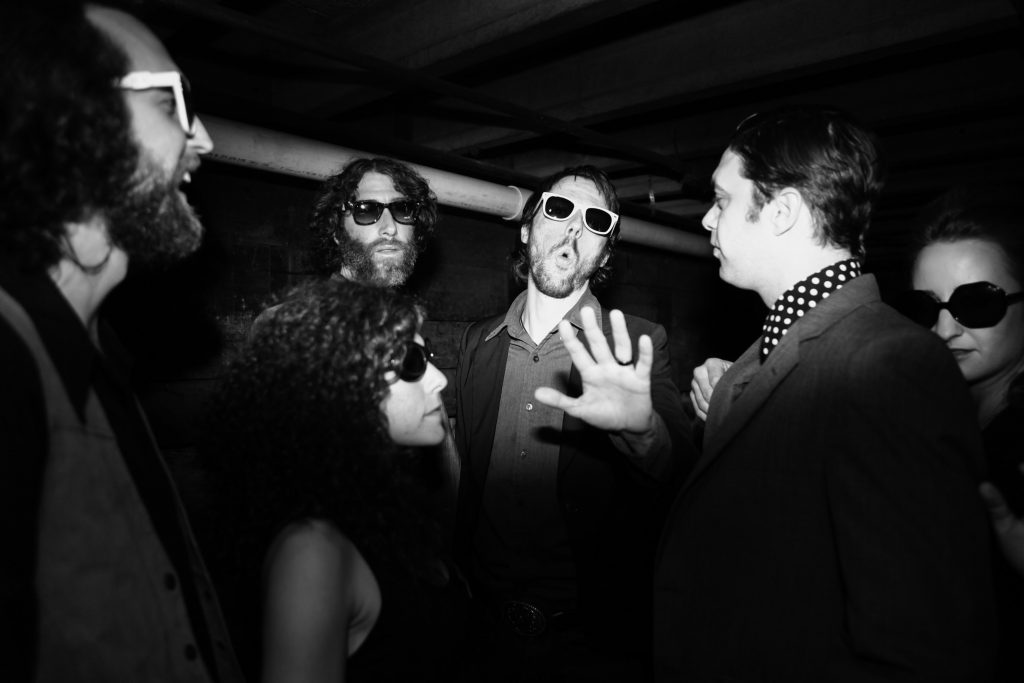
“If you ran into us a couple of years ago, we’d be all badass,” says Jeremy Ivey, guitar player and founding father of Buffalo Clover. He shakes his fist like Danny Zuko delivering a stump speech. Then he smiles and adds, “But today, we’re more humble.” Despite their modest nature, Buffalo Clover still carries a reputation for hard-traveling, hardworking, and hard-partying. This energy has propelled the Southern-soul-psychedelic band’s sound from the effervescence of horns and funk to the edge of a new realm with Middle Eastern rhythms and electronica. Sure, they still host the standard rock and roll arrangement, but they are mad scientists ready to experiment, and the magic is boiling over.
Outside the Stone Fox, the temperature flirts with fifty-five degrees. The gray clouds pull a shade over the sun and diffuse the hottest spikes on its early spring crown. Margo Price, lead singer, sits across from me. She’s wearing sunglasses with lenses the size of saucers. Jeremy, her husband, sits next to her. His black hair sweeps across his forehead, and he pulls a pack of cigarettes out of his pocket. “You mind?” he asks. Margo smiles and assures me it’s not too cold to sit outside.
Margo grew up on a small farm in Illinois. Her parents were over-leveraged and scraping to get by. This isn’t a sob story; this is a small American farm story. This narrative usually ends one of two ways. For their neighbors, the story ended when a large conglomerate gobbled up the land. For Margo’s folks, it ended when the bank called in their debts after a terrible drought. “Everything changed,” she said. “My dad went to work at a prison. My mom went back to school to be a teacher.” Her folks still own the house but going home doesn’t mean the same thing anymore. “It was a change in America that will probably never happen again,” Jeremy adds with a perspective on the big business of farming.
If Jeremy’s words sound like a well-lived philosophy, it’s because his vagabond youth taught him as much. After high school, he skipped college in favor of a personal education gathered by traveling back and forth across America. Growing up, his parents shunned secular music. As a result, Jeremy’s release into the wild led to massive consumption of The Beatles, Led Zeppelin, and The Rolling Stones. Those bands—and truckloads of others—formed the foundation of his rock and roll experience. To satisfy his appetite for the thoughts of creatives before him, he devoured Nietzsche, Durant, The Tao de Ching, and Beat poetry. In 2004, his Kerouacian lifestyle was running full tilt when he found himself at a party in Nashville.
At the same party, Margo spotted him across the room. Fearless and spirited, she swept over to say “Hello.” After shaking Jeremy’s hand, Margo told her friend, “One day, I’m going to marry that man.”
Jeremy and Margo launched into music projects. Band rehearsal was held in their rundown house on the West Side. As a matter of fact, that house was across the street from that bar that would become The Stone Fox. Back then, the bar was Len’s Den, a biker joint with little patience for the liberal “artsy” crowd. If the rowdy bar wasn’t rough enough, one night during band practice, Margo heard POP! POP! over the wail of screaming guitars. The owner of the Stop ‘N Shop at the corner grabbed a gun from a would-be-robber and killed him. This rough-and-tumble neighborhood fit well for the band, but when Margo’s parents came down to visit, they weren’t impressed. “My mom showed up and cried,” Margo says with a nervous laugh.
At this time, the band was called Secret Handshake, and the music carried social-political messages. “We had songs called ‘Bloodshed’ and ‘Architects of War,’” Margo says. Their commentary focused on the conflict in the Middle East and the economic crisis in the U.S. These themes didn’t seem to move the audience at Midtown spots like Blue Bar. “But the music was also groovy and catchy,” Jeremy assures me.
Taking an exit from heavy political commentary, Jeremy and Margo made their first great direction change. Jeremy recalls that the decision was a quick one: “We decided to regroup and figure out a new direction. We changed our name to Buffalo Clover.” As a reference to the Midwest, it spoke to their roots. “My grandparents’ farm was in an area called Buffalo Prairie,” Margo says. “I always remember my grandmother talking about this clover that used to come up. It was a sad thing to hear that, because there were fewer and fewer buffalo, and that meant there was less of this clover.”

Buffalo Clover or Trifolium stoloniferum is an endangered species of clover. The plant thrives due to the trampling of large animals, specifically buffalo. The romance of this perennial’s backstory drew the couple in. “It requires stress and duress to grow,” Jeremy says with a nod to the band’s own fight against endangerment.
In 2010, Margo was pregnant and Jeremy was thrilled. Turns out, she was pregnant with twins, but the fear of being a new parent got more complicated. At nineteen weeks, the doctor discovered that one of the twins only had half of a heart. The term is “Hypoplastic Left Heart Syndrome,” and it occurs in less than three percent of U.S. births.
Over the next several months, doctor’s appointments tracked the progress of the pregnancy. Despite the heart issue, the baby boys appeared healthy. Margo and Jeremy had tough conversations with their doctor about the reality of the baby’s life. They were told he could live to be thirty, maybe, and they should prepare for complications along the way.
Just before July 4th, Judah and Ezra were born at Vanderbilt Children’s Hospital. Doctors immediately moved Ezra to ICU. Margo and Jeremy split their time at home with Judah and at the hospital with Ezra. Margo yearned to spend every hour with both sons and the division of time was painful.
Nearly a week old, Ezra was stable enough for surgery. From here, the hours blur together. A stint was replaced. Ezra was on life support. He had been deprived of valuable oxygen. He didn’t survive.
Margo recalls the events slowly, “They wanted me to go back into the room to say goodbye.” She walked in and froze. Even today she still searches for the words, “Then, two nurses handed me a lifeless child.” She’s silent. This was the first time she held Ezra without monitors and IV lines wrapping his body like a web.
Margo unraveled. She slipped into deep bouts of guilt and self-medication. The infant gift boxes and sympathy cards arriving at their home were constant reminders of her loss. When they stopped coming, she felt even worse. Was this her fault? Was she being punished?
Jeremy and Margo put the band on hold, and the volume dropped to the murmur of a baby monitor. Their son, Judah, and their resolve to be good parents became their focus. “Instead of talking to someone on a couch, we sat and talked to each other,” Jeremy says. This was a low period personally and professionally. Jeremy had a hard time internalizing his anger. Margo drowned her grief. She made bad decisions—drinking too much and dealing with the resulting legal fallout. “I have been affected by this as a parent,” she explained. “It’s been a long road trying to get past it.”
Over the following year, Jeremy and Margo started rebuilding the music. They picked up their guitars and put words on paper. The writing started with a drip and graduated to a steady stream. They poured their emotions into new music and rededicated themselves. “During that period of time, music is what brought us around,” Jeremy recalls. Knowing how bands burn out due to lack of focus or organization, he adds, “I don’t know if we’d be playing right now if that had not happened.”

She spent many days and nights with self-loathing and self-pity. “For a while, I thought nobody had it as hard as me and nobody had been through the things I’ve been through, but once you talk to people, you realize that everybody’s been through something awful once you live long enough.” She turned her focus to the positive aspects of life and paraphrases Mark Twain a bit, “I realized that I didn’t want to be a martyr anymore because being a martyr covers a multitude of sins.”
Leaning on each other and their band, Margo and Jeremy got in tune. “We both latched on to something more than love,” Jeremy says, stamping out a cigarette. They softened the rhetoric and amped up the hooks with their rebirth of Southern rock. Horns and backup singers provided deep soul, and a willingness to dive into sonic exploration opened up the doors to psychedelia. Buffalo Clover was back again.
With renewed vigor and the support of a successful Kickstarter campaign, they cranked out a new album. They recorded “Test Your Love” at the Bomb Shelter and landed Alabama Shakes singer Brittany Howard for vocal support. The songs were rowdy, horn-laced burners with a twist of Southern soul and rock and roll. With leftover Kickstart funds, they self-financed a trip overseas and ripped through a brief but successful tour of the UK. “I had high hopes for the last album, but…” Margo’s voice trails off.
Predators smelled the infusion of cash from their Kickstarter campaign, but silver tongues went silent when the time came to deliver on promises. “Tons of UK reviews and appearances on BBC, but when we got back to the US,” Margo pauses for a moment. “Nothing.”
We both latched on to something more than love
The band was promised attractive publicity and smart reviews from key publications. But, as Margo points out, nothing. Nothing may be an exaggeration, but the momentum slowed compared to the push from their first album. The experience left a sour note, but with a video premiere on our very own NATIVE website and a song review in Paste Magazine, the stone is beginning to roll.
Regardless, Margo and Jeremy are happy with their work. Buffalo Clover is finding their home with local bands and gleaning insights from Nashville’s wealth of high quality players. “It’s always inspiring when you play a show with three other bands and everyone is really good,” Jeremy says. “But it’s nice to travel and be pampered and treated like a rock and roll God!” Margo tags on.
With short tours around the States and plans to get back to the UK, the band is working harder than ever. When they are on the road, Margo takes Judah to her parent’s home and checks in on Skype. “There’s a lot of guilt going out on the road and not having him there,” she adds, but she and Jeremy take care of each other and focus more on the work and less on the party.
On top of the touring, they recorded a live album of new material at The 5 Spot that will be released on Record Store Day, April 19th. You can catch Buffalo Clover celebrating the event with a set at Fond Object.
As if all that isn’t enough, they are starting work on a new studio album. The new effort represents a departure from their ‘60s and ‘70s sound. “We’re into bands like Tame Impala, Cass McCombs, Liam Hayes, and more modern music,” Jeremy explains. “I think the next recording we do will be miles away from the last record.” How far away? Margo tells me, “Our guitar player, Matt, was gifted a sitar and a theremin.” Expect the unexpected.
The band was promised attractive publicity and smart reviews from key publications. But, as Margo points out, nothing. Nothing may be an exaggeration, but the momentum slowed compared to the push from their first album. The experience left a sour note, but with a video premiere on our very own NATIVE website and a song review in Paste Magazine, the stone is beginning to roll.
Regardless, Margo and Jeremy are happy with their work. Buffalo Clover is finding their home with local bands and gleaning insights from Nashville’s wealth of high quality players. “It’s always inspiring when you play a show with three other bands and everyone is really good,” Jeremy says. “But it’s nice to travel and be pampered and treated like a rock and roll God!” Margo tags on.
With short tours around the States and plans to get back to the UK, the band is working harder than ever. When they are on the road, Margo takes Judah to her parent’s home and checks in on Skype. “There’s a lot of guilt going out on the road and not having him there,” she adds, but she and Jeremy take care of each other and focus more on the work and less on the party.
On top of the touring, they recorded a live album of new material at The 5 Spot that will be released on Record Store Day, April 19th. You can catch Buffalo Clover celebrating the event with a set at Fond Object.

As if all that isn’t enough, they are starting work on a new studio album. The new effort represents a departure from their ‘60s and ‘70s sound. “We’re into bands like Tame Impala, Cass McCombs, Liam Hayes, and more modern music,” Jeremy explains. “I think the next recording we do will be miles away from the last record.” How far away? Margo tells me, “Our guitar player, Matt, was gifted a sitar and a theremin.” Expect the unexpected.
Just like their namesake, they’ve been trampled upon by something larger than they can imagine, but they’ve come back again and again. Their experience as a band has taught them a lot about professional musicianship and perseverance; their experience as parents has taught them more about the passion required to make it all work. Are they happy? “Happiness feels just a bit further than an arm’s reach away,” Jeremy answers. “But,” Margo adds, “I feel more comfortable in my own skin and optimistic about the future.”
The future is inevitable, but does the past still haunt them? Jeremy looks at Margo. She has been low, angry, and hurt, but he sees beyond that. He sees his friend and band mate. He sees his wife and the mother of his son. Jeremy, still looking fondly at Margo, says, “It took a while for her to find that she could be…” Margo cuts him off with a smile, “Fearless.” I disagree. I think she’s been that way since day one. Just like Jeremy. Just like Buffalo Clover.


























